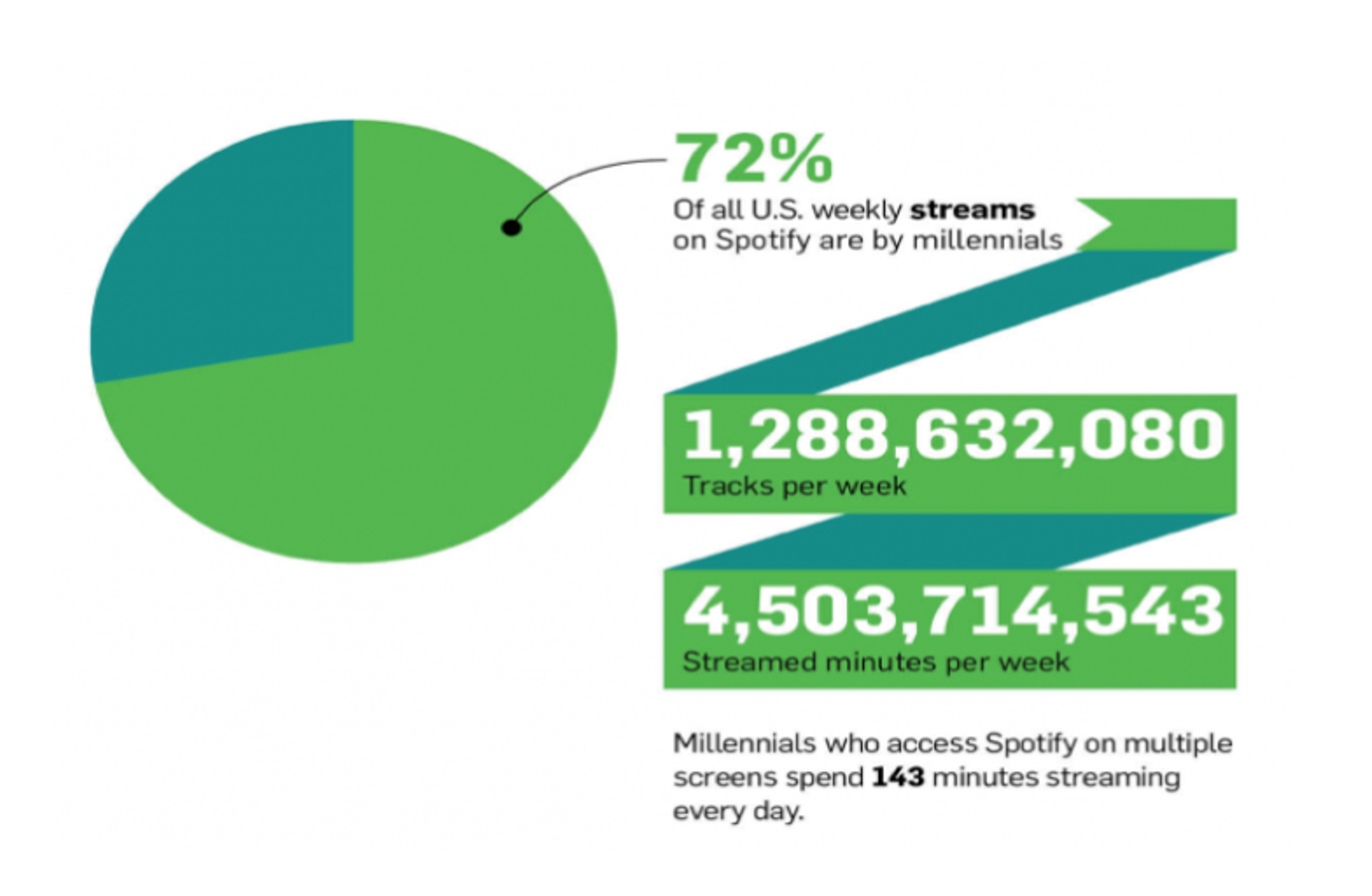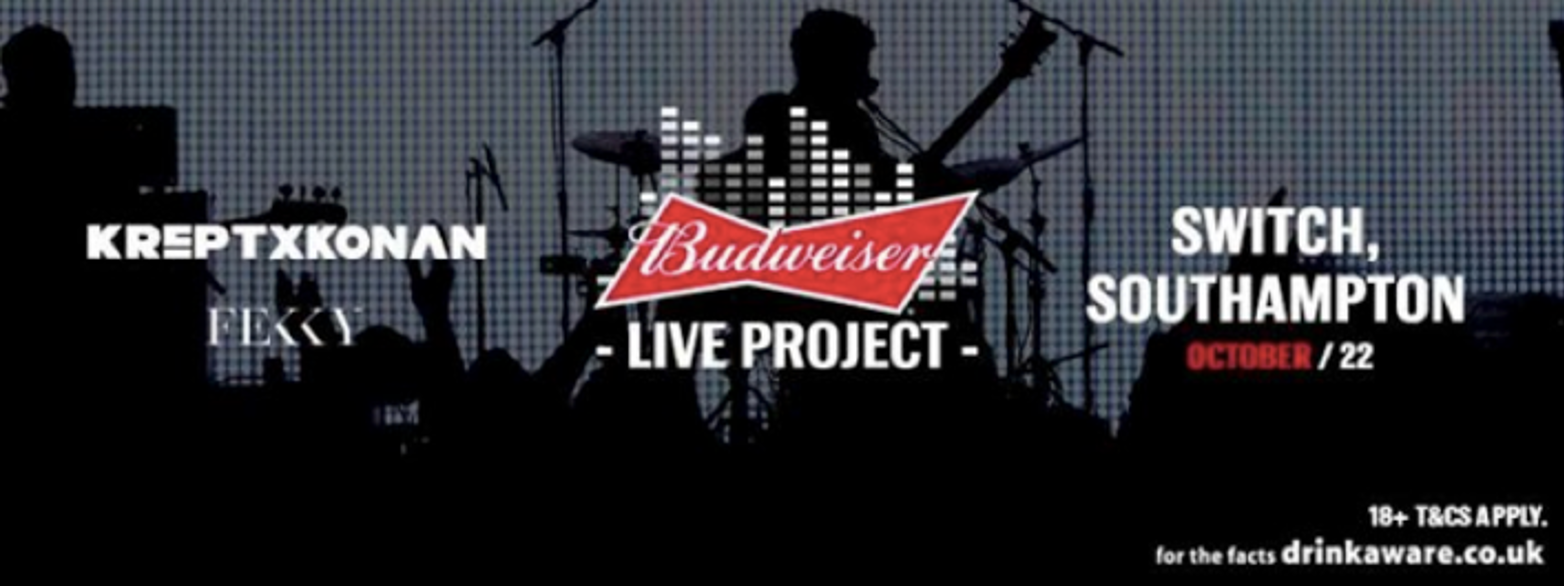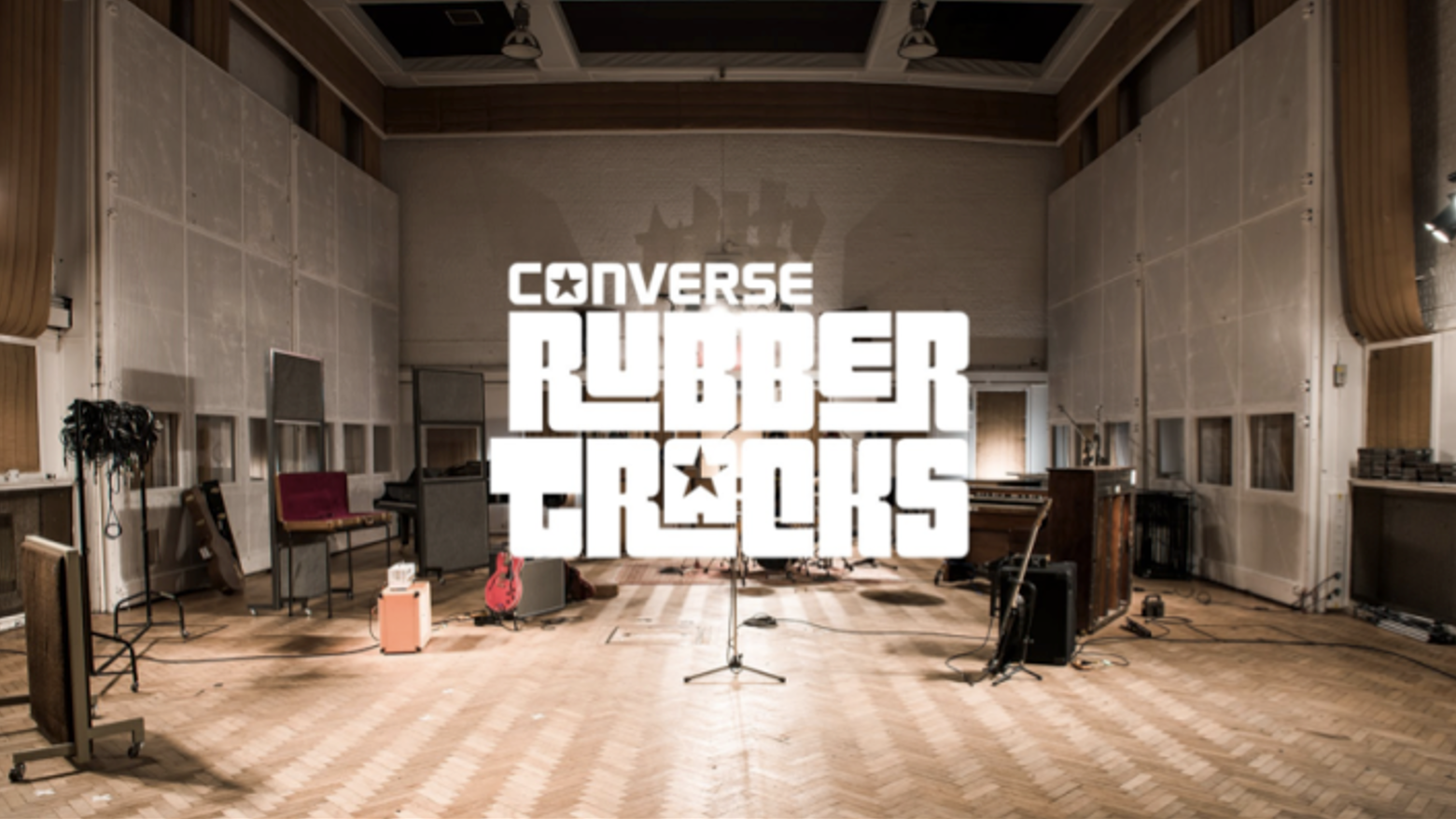Millennials, Music & Brands
72% of all Spotify listeners in the US are millennials. Nothing surprising about this statistic, after all young people and music have always had a close affinity, ever since rock and roll fuelled the advent of youth culture back in the 1950s.
But this group in particular, also known as Generation Y, born between 1982 to 2004, make up the largest proportion of people using the Spotify’s streaming service today. And if you dig deeper into the recently published data, it uncovers some revealing facts: that they spend 143 minutes every day streaming. That’s almost 2.5 hrs a day. That’s over a billion tracks a week. And they listen not only more frequently but also in more places as they move from home to school to work with 72% listening on mobile devices.
As Spotify CMO Seth Farbman puts it “They are connected all day from the moment they wake. They are the exact audience—that millennial audience—that almost every brand is trying to attract. And it is an audience that is open, because when you’re listening to music, you’re in a state of emotional openness. Just think about why we even play music: to feel better, to expand ourselves.“
“They are connected all day from the moment they wake. They are the exact audience—that millennial audience—that almost every brand is trying to attract. And it is an audience that is open, because when you’re listening to music, you’re in a state of emotional openness. Just think about why we even play music: to feel better, to expand ourselves.“
So music matters enormously to this much-coveted generation, that much is clear. It unlocks a ‘state of emotional openness’. But in order to truly connect and engage with them brands need to behave in way that’s relevant, meaningful and authentic. This means understanding their behaviour, what they care about, their motivations and their values and delivering music driven experiences that deliver against this mind-set.
Everytrack Everywhere
According to a study conducted by youth marketer Ypulse, 83% of millennials “couldn’t imagine their lives without music.” That’s because, growing up in the ’90s and early ’00s, they’ve never had to. Ever since iTunes and early MP3 players were released, millennials have been able to take their music with them wherever they go, choosing their favourite songs and customising playlists to suit their moods or create a soundtrack for their everyday lives.
Then came the idea of personalised radio, with websites like Pandora making a huge splash in the music market by allowing users to create their own stations based on specific songs or artists—a revolutionary idea which spread like wildfire among music lovers. Now, nearly 80% of millennials listen to Internet radio, citing the ability to skip songs, create their own stations, and hear fewer commercials as its main appeals.
“nearly 80% of millennials listen to Internet radio, citing the ability to skip songs, create their own stations, and hear fewer commercials as its main appeals.”
They don’t respond to traditional broadcast advertising and are naturally suspicious of brands. Therefore marketers need to re-frame their approach and find more innovative ways to engage with them and create a meaningful dialogue.
Are you Experienced?
Since 1987 the share of consumer spending on live experiences and events relative to total U.S. consumer spending increased 70%.
The millennial generation not only values experiences, but is increasingly spending time and money on them: from concerts and social events to cultural experiences. For this group, happiness isn’t as focused on possessions or career status. Living a meaningful, happy life is about creating, sharing and capturing memories earned through experiences that span the spectrum of life’s opportunities.
And for brands, the opportunity exists within music to create value for their customers and build a lasting relationship unlike any other. As research from AEG shows, 89% of young people attending festivals perceive brands as more authentic when sponsoring a live music experience (vs. 56% among non-attendees).
“89% of young people attending festivals perceive brands as more authentic when sponsoring a live music experience”
And of millennial respondents who engaged in a branded music experience, 93% like brands that sponsor live events; while 8 in 10 say the most effective way to connect with them is through a branded live music experience. Moreover, 81% of millennials claim that the coolest brand experiences they’ve seen are around live events.
A recent example is the Budweiser Live Project, the beer brand’s first UK foray into live music which showcased upcoming live acts around nine different UK cities. And as a way of distributing tickets it used ticketing and gig app, Dice that has a strong millennial user-base.
In addition to signing up over 13,000 people to its events over the two weeks, a further 5,500 people were added to the brand’s list for future events through Dice’s mobile platform.
“It was important to get the balance right between communicating and spamming,” said Dice music editor and former Radio 1 DJ Jen Long. “We wanted to tell the story around the experience”
The brand also partnered with Spotify to enhance the fan experience, creating the Budweiser Live Project Hub showcasing information about tour dates and artistes, as well as live, behind-the-scenes video content from the events.
A Shared Canvas
In addition to their passion for live experiences, millennials are also redefining the relationship between the customer and marketer, and the customer and service provider. Alex Castellarnau at Dropbox, the popular file transfer service, puts it this way: “With millennials, a new brand, service or product is only started by the company; it’s finished by the customers. millennials are a generation that wants to co-create the product, the brand, with you. Companies that understand this and figure out ways to engage in this co-creation relationship with millennials will have an edge.”
“With millennials, a new brand, service or product is only started by the company; it’s finished by the customers. millennials are a generation that wants to co-create the product, the brand, with you.”
One brand that has effectively, consistently and imaginatively used music to achieve this ‘edge’ is Converse. Converse’s Rubber Tracks studio in Brooklyn is an innovation in musical marketing inspired by co-creation. The studio, founded in 2010, is the home of high-profile programs like the “Three Artists. One Song” collaborations, where three very different stars come together to record a song. But in its daily operations, Rubber Tracks provides free, no-strings-attached recording time to indie bands that couldn’t otherwise afford studio time with world-class engineers and producers.
http://conversemusic.tumblr.com/
The Opportunity for Brands
So from the goods they purchase to their interaction with brands, millennials put a premium on authenticity, creativity, distinctiveness and they welcome brands into their music experiences. And although there is diversity in their demographic profiles (and musical tastes), they are broadly united by their values and motivations.
3 key principles then, for brands to bear in mind when marketing to this elusive audience:
First, understand and speak to the values that drive them – connectivity, passion, diversity, sharing and discovery.
Second, understand their lifestyles and experiences and find ways to amplify their reality through innovative music partnerships.
And, finally, make sure they feel informed, involved and provided with a canvas to co-create – not just marketed to. It’s the brand and marketing world’s challenge now to do so in a way that is unobtrusive, memorable and provides authentic value to both sides. There’s never been a better time to connect brands with millennials through music.
See more blog articles >


